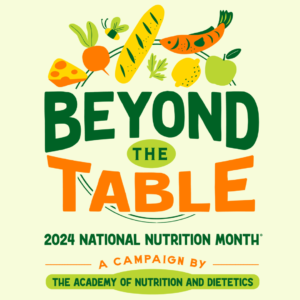 National Nutrition Month® reminds us to consider the impact of our food choices on our health and the environment. The theme “Beyond the Table” encourages us to look at the broader implications of what we eat and drink. Our daily food choices play a significant role in shaping our well-being and the sustainability of our planet. However, it is essential to acknowledge that access to nutritious food can be a challenge for some individuals and communities.
National Nutrition Month® reminds us to consider the impact of our food choices on our health and the environment. The theme “Beyond the Table” encourages us to look at the broader implications of what we eat and drink. Our daily food choices play a significant role in shaping our well-being and the sustainability of our planet. However, it is essential to acknowledge that access to nutritious food can be a challenge for some individuals and communities.
Food insecurity, defined as limited or uncertain access to adequate food, is common and is associated with higher rates of poor nutrition and increased risk for chronic diet-related conditions such as diabetes, obesity, heart disease, and mental health disorders. According to the National Institute on Minority Health and Health Disparities (NIH), almost 15 percent of U.S. households in 2020 were considered food insecure at some point, meaning not all household members were able to access enough food to support an active, healthy lifestyle. Nearly half of those households included children.
Addressing limited access to nutritious food options requires collective action and support systems. The public health arena recognizes food insecurity and poor nutrition as health issues. It is partnering with food and nutrition organizations, such as the U.S. Department of Agriculture (USDA), to develop programs and resources to improve access to nutritious foods and promote food equity. Initiatives such as community gardens, food banks, and educational programs can help empower individuals to make healthier food choices despite constraints.
By advocating for policies that promote food equity and investing in local food systems, we can work towards a future where everyone has the opportunity to nourish themselves in a sustainable way. National Nutrition Month® reminds us that we can create a healthier, more equitable future for all by coming together to address these challenges.
Click the link for information on Food Assistance Programs through the USDA in your community.
